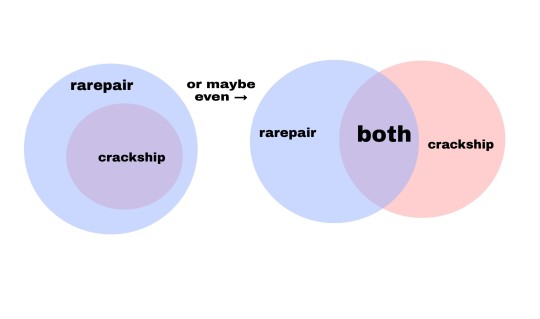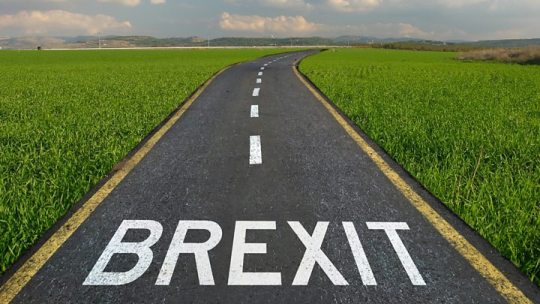#the poll had several hundred more votes than the others in the thread it was funny sdjgjklmks i only saw it after it ended
Explore tagged Tumblr posts
Note
I think one aspect to measure a ship's rarepairness is it's popularity when compared to crackships. If it's more popular than generic crackship 254 then it's probably not a rareepair but if more people will know the crackship than the alternative serious and maybe even well thought out ship between two characters then it is probably most probably a rareepair
i wasnt rly talking about differences between rarepair and crackship but more "what makes a ship popular" in general
imo the difference between crackship and rarepair is the amount of canon content 🤔 crackships don't need a base at all but rarepairs usually have one. if it's "these two characters who haven't talked much would be interesting together" then it's a crackship (what makes a ship rare is a bit harder to measure and each case it's exclusive because you have to take a lot of factors into account). But. i don't think they're mutually exclusive things it's more like. all (or almost all) crackships are rarepairs but not all rarepairs are crackships. for example i'd say rinne/shu is somewhat a crackship? it doesn't have much canon content afaik. meanwhile mitsu/haji, who are both in the same unit and have had several 5*+4* events together, are more of a rarepair: neither are each other's most popular ship, or even second most-popular. but also rinne/shu have 80 fics on ao3 (which is more than some def not rare ships) and mitsu/haji have 11. of course character popularity plays a huge part here (big part of why i said its hard to measure how rare a ship is) (did u guys know kaname has more fics than mitsuru) but my point is.

you could place mitsu//haji in rare, rinne//shu in crack and (spins roulette) haji//shu in both and it all quite checks out
#your example specifically remids me of this one time i saw a twt poll where hii.kasa won over trks for best tsukasa ship#and there were a few people on the qrts like ''guys maybe we should catch up on our reading if trks rly lost''#(there was however another factor to be taken into account on that poll: it had quite a number of hiiks qrts in spanish#and those guys are infamous for botting#the poll had several hundred more votes than the others in the thread it was funny sdjgjklmks i only saw it after it ended#but yeah measuring rarity is hard#starpros sunshine#preguntas
20 notes
·
View notes
Text
%news%
New Post has been published on %http://paulbenedictsgeneralstore.com%
Bbc news Coronavirus: ¿Qué es lo último con Brexit y otras grandes historias?

Bbc news
.spinner-container width:25%; top:20px; left:50%; margin-left:-12.5%; border-radius:8px; position:fixed; text-align:center; box-shadow:0 0 10px rgba(0,0,0,0.24); background:#fff; overflow:hidden; .spinner-container p font-family:'Roboto', Arial, sans-serif; color:rgba(0,0,0,0.87); margin:12px 0 16px 0; padding:0; font-size:12px; .spinner-container img width:22px; height:22px; margin:16px 0 0; padding:0;

Translating...
Image copyright AFP
Image caption In Syria, which recorded its first coronavirus death in slack March, the wrestle has entered its 10th year
Over the previous few months, the coronavirus pandemic has absorbed the total energy of the information cycle. There hasn't been an tournament be pleased it in our lifetimes.
Nonetheless this is now not the truth is to lisp that it is the excellent famous thing taking place on this planet bright now. So what is taking place on in different locations - and what took blueprint to some of the opposite colossal information experiences of the year?
Consider Brexit?
For roughly three years you hardly heard about anything else else in the UK. Now, obviously, the point of interest is on the coronavirus pandemic. Despite Prime Minister Boris Johnson requiring health middle therapy after contracting Covid-19 and the European Union and UK chief negotiators handiest recently popping out of coronavirus quarantine, Downing Road insists it must follow its common timetable.
The UK formally left the European Union on 31 January. Nonetheless we're now in a transition duration up to 31 December, at some point of which the UK is still treated comely remarkable as an EU member whereas negotiations proceed.
Britain's govt says an EU-UK commerce deal must still be in blueprint by the final day of the year. Nonetheless although no longer, the UK may possibly possibly no longer lengthen the transition duration previous that closing date.

Media playback is unsupported to your machine
Media captionBrexit: How did we score here?
The premise in the support of the transition duration turn out to be as soon as to minimise disruption introduced on to industry and jog back and forth between the UK and the EU. It will even be extended by a year or two - which the EU thinks would be a impartial correct pass beneath the instances.
There has handiest been one spherical of EU-UK commerce negotiations up to now. They restart this week by video convention and all facets lisp they'll possess their handiest to possess correct and instant development. Nonetheless time is slipping away.
Brussels additionally asks whether UK and EU corporations - already combating the upheaval attributable to the coronavirus - need one more colossal commerce come the pause of this year. Nonetheless whatever they concentrate on, EU leaders may possibly possibly no longer formally demand the UK for an extension. The tight timetable turn out to be as soon as determined by Boris Johnson, they lisp. A name to prolong - if there may be one - must come from London.
A ceasefire few expected to final is preserving in Idlib, for now, because the final insurrection-held establish in northwest Syria braces for the expected onslaught of the lethal coronavirus.
"Other folk are breathing for the time being, and that is also considered as a side catch of the pandemic," says Hassan Hassan of the Middle for World Policy. "The ceasefire is inserting by a thread, nonetheless it no doubt's inserting on the opposite hand."
The 5 March truce agreed by Russia and Turkey halted a unhealthy escalation after Ankara sent hundreds of its troops all over the border to study out to live a Syrian offensive to retake this final province lost in 9 punishing years of wrestle.
Nonetheless Idlib's breathing establish is additionally fraught with apprehension of this recent enemy. The province's health system has been decimated by battling, along with the blistering air advertising and marketing and marketing campaign by Russian and Syrian warplanes. With regards to a million displaced folks, sheltering inside flimsy tents, or on open flooring, have faith few defences in opposition to the highly effective Covid-19.
"There is a humanitarian and political imperative… for a total, instant nationwide ceasefire at some point of Syria," acknowledged UN Special Envoy to Syria, Geir Pedersen, in his most up-to-date briefing to the UN Security Council.

Media playback is unsupported to your machine
Media captionCoronavirus: Fears of virus in Idlib refugee camps
Turkey and Russia, who support opposing facets, now name the shots.
"I catch no longer concentrate on Turkey or Russia judge this ceasefire will shield for a actually lengthy time," says Dareen Khalifa, Senior Analyst with the World Crisis Community. "It left key points unresolved."
That contains the ability forward for the jihadist neighborhood Hayat Tahir al-Sham (HTS), which dominates Idlib.
The HTS, sceptical of this truce, is purported to be regrouping. The Syrian and Turkish armies are additionally taking support of this live to supply a get to in preparation for the subsequent spherical of war.
It may possibly possibly possibly possibly effectively be bright a subject of time - nonetheless now, it appears to be like, is no longer the time.
For practically a month, the speed amongst Democrats to glance who would select on US President Donald Trump in the favorite election turn out to be as soon as in deep freeze. Broken-down Vice-President Joe Biden had a commanding lead in the primaries, nonetheless self-professed democratic socialist Bernie Sanders - as soon as map to be the entrance-runner - turn out to be as soon as unwilling to concede.
Meanwhile, snort after snort postponed their predominant votes thanks to the coronavirus pandemic. Every candidates cancelled all public events and handiest issued video statements and conducted interviews from their homes.
That modified on Wednesday, as Sanders suspended his advertising and marketing and marketing campaign, all nonetheless making certain that in November American voters will select between Trump and Biden.

Media playback is unsupported to your machine
Media captionSanders: "I wish I had better information"
Precisely when - and how - the two candidates may be formally nominated by their events is in some doubt, on the opposite hand. The Democrats have faith already moved their national convention from mid-July to August in the hope that a gathering of hundreds of activists, officers and celebration devoted will then be doable, each from a health and logistical standpoint. Nonetheless that recent date, at the side of the Republican convention location for the pause of August, still appears to be like questionable.
As for the speed itself, Trump has considered a microscopic bump in his poll standings for the reason that pandemic began, doubtless because of the his ubiquitous tv presence in each day afternoon White Residence press conferences.
Biden still holds a microscopic support in head-to-head matchups, on the opposite hand, suggesting the speed is destined to be shut. Nonetheless there is just not any telling what the national mood may be in a couple of weeks, let on my own when the November vote casting day arrives.
The warfare in Yemen, which entered its sixth year in March, has lengthy been labelled the enviornment's forgotten wrestle. With the previous few weeks seeing one more spike in the battling, and because the enviornment's consideration is firmly mounted in different locations, Yemen's wrestle has felt extra forgotten than ever.
Two weeks ago, assaults on cities in Saudi Arabia, claimed by Houthi rebels, led to a series of retaliatory airstrikes on Northern Yemen by the Saudi-led coalition.
It is no longer the truth is bright the battling that Yemen's civilians are having to suffer. I remember reporting on the cholera epidemic in 2016, and reminiscences of the nation's incapability to answer to the spread of the illness are still fresh in my mind. It turn out to be as soon as heart-breaking to survey as folks that had diminished in dimension the illness stumbled on they'd no health middle to flip to.

Media playback is unsupported to your machine
Media captionThe hidden victims of the Yemen wrestle
That Yemen is now going thru the specter of a recent ruthless illness, one which requires health middle beds and ventilators the nation doesn't have faith, is a horrible prospect.
The announcement of a ceasefire this week may be welcome information for most Yemenis, nonetheless the heavy toll of the previous half of-decade methodology that although the wrestle turn out to be as soon as to total as of late, it may possibly possibly well select decades for the nation to get better. Six years of bombings and destruction have faith resulted in what the UN has called "the enviornment's worst humanitarian crisis".
The scale, severity and complexity of the nation's wants are staggering. The wrestle has deeply fractured Yemen's financial system and diminished its public institutions, its infrastructure and its health system to rubble. Eighty per cent of the total population require exterior abet bright to continue to exist. And but, the UN launched this week that it turn out to be as soon as reducing its operations in the nation, citing lack of funding.
Because the spectre of Covid-19 looms better, folks all over Yemen, fully mindful that their nation merely may possibly possibly no longer be ready to manage in opposition to the upcoming threat, are bracing themselves.
In early November, the Peaceable South Wales govt launched a snort of emergency and issued the predominant catastrophic fire warning for the reason that rating turn out to be as soon as keep in blueprint 10 years ago.
File-breaking heat, right winds and the relentless drought - which lasted for at the least three years in some areas - fuelled the bushfires. The blazes left 11 million hectares scorched and extra than 2,000 properties destroyed. Australia's natural world turn out to be as soon as decimated. A billion animals had been lost and photography of burned koalas and kangaroos made world headlines.

Media playback is unsupported to your machine
Media captionHell to excessive water: Australia’s summer season of extremes
The controversy and anger in opposition to the top minister and the ability he dealt with the crisis and his ability to climate commerce had been as remarkable a component of the fable because the fires themselves.
At final the rain came, flooding some areas whereas ending years of drought in others. There turn out to be as soon as enough rain to keep out most of the fires till they had been all beneath shield a watch on. It turn out to be as soon as a grand reprieve for the volunteer firefighters who had no longer stopped working for months and had been exhausted.
On 31 March, the Peaceable South Wales Rural Fire Provider launched the legit pause of essentially the most unfavorable bushfire season the snort and the nation has experienced. Even though the fires are out, the injury is still there. The bushfires had a catastrophic affect on the financial system - especially in the tourism sector.
Many communities have faith been making an strive to rebuild, nonetheless it no doubt's been a uninteresting and complex job, now made extra sophisticated by the truth all the pieces is on shield thanks to Covid-19. Many households are panicked that with the govt. now turning their plump consideration to tackling the virus, their very dangle losses and struggles may be forgotten.
function gtElInit() var lib=new google.translate.TranslateService(); lib.setCheckVisibility(false); lib.translatePage('en', 'es', function (progress, done, error) done );
0 notes
Text
Shiva Ayyadurai’s Senate Campaign Was Being Promoted By Fake Facebook Accounts
New Post has been published on http://liststories.com/shiva-ayyadurais-senate-campaign-was-being-promoted-by-fake-facebook-accounts/
Shiva Ayyadurai’s Senate Campaign Was Being Promoted By Fake Facebook Accounts
"id": 121753448 , "is_fullsize": true
BuzzFeed News; Getty Images
"id": 121753414
Patti Johnson is a die-hard Trump supporter. Her Facebook profile photo shows her in an American flag bikini with “Trump 16” handwritten written across her chest in a white gel.
Since the summer, she’s also been working hard to promote the candidacy of V.A. Shiva Ayyadurai, a wealthy entrepreneur running as an independent to unseat Massachusetts Democratic Sen. Elizabeth Warren this November. He’s a distant third in the polls, but Ayyadurai has managed to attract attention for his slogan, “Only a REAL Indian can defeat the Fake Indian,” a dig at Warren’s claim to Native American heritage. He previously gained notoriety for a claim that he invented email, which is disputed by internet historians, and was known for being married to actor Fran Drescher. (They split in 2016.)
Johnson certainly felt he was worth fighting for; she was one of the “Top Fans” for Ayyadurai’s Facebook page. On Aug. 17, she shared a video to at least 10 different Facebook pages and groups showing Ayyadurai supporters protesting outside of Warren’s Cambridge home. In her posts she turned the pro-Warren mantra “Nevertheless, she persisted” on its head, writing instead, “nevertheless WE persisted #Shiva4Senate #MAGA #KAG.”
But three weeks ago, after inquiries from BuzzFeed News, Facebook deleted the Johnson account along with at least three other fake profiles that appear to have been part of a coordinated astroturfing campaign to benefit Ayyadurai. Facebook also removed three profiles and a page belonging to a key Ayyadurai campaign volunteer, Frank Licata.
"id": 121753473
Boston Globe / Getty Images
Shiva Ayyadurai (center) makes his way to the Boston Free Speech rally where he was scheduled to speak at the Boston Common, Aug. 19, 2017.
"id": 121753414
A Facebook spokesperson told BuzzFeed News the company “disabled several accounts and Pages for violating our policies against fake accounts, spam, and misrepresentation.”
Though this instance of false amplification was small-scale compared to the millions of impressions generated by Russian trolls during and after the 2016 election, it demonstrates the ongoing presence of astroturfing and fake accounts in US politics.
The fake profiles were created in June and July and appear to have been dedicated solely to pushing positive messages about Ayyadurai, attacking his opponents, or engaging in flame wars with people on Facebook who don’t support him. The four fake accounts alone were responsible for hundreds of posts and comments over the summer before being shut down. They often shared the same content at the same time as the Licata profiles and page, though there is no direct evidence that Licata was behind them.
Ayyadurai’s campaign relies exclusively on volunteer labor, and Licata is one of his most active volunteers. He was personally thanked in a June 25 campaign email. BuzzFeed News asked Ayyadurai about the fake accounts and the removed pages at a recent campaign event. He said he knew nothing about them and asked, “Really, who are they?” He said he only manages his Twitter account and declined to say who runs his verified Facebook page with over 40,000 followers. After more questions about the removed accounts, he ended the interview.
“We’re going to end this interview right now because you’re doing an insane and inane interview,” he said. “I’m a serious political candidate.”
Ayyadurai added, “You’re doing a racist interview right now because you’re a racist. You are. You’re reducing a guy who busted his ass, came from India with nothing, to nonsense. And you came here to do a hit piece and you should go out.”
He did not respond to follow-up requests for comment by phone and email.
When asked about the fake accounts and the simultaneous removal of his profiles and page, Licata said in an email, “I don’t know about that, but what I do know is that I love patriotic American revolutionaries like our great President Trump and Dr. Shiva Ayyadurai, the next US Senator from MA!”
Along with the four fake profiles, Facebook removed a group called “Geoff Diehl Betrayed Trump,” which targeted the GOP nominee. (Ayyadurai originally intended to earn the GOP nomination but later gathered the 10,000 signatures necessary to appear on the ballot as an independent.) That Facebook group has seen people share misleading claims about Diehl being a “Fake Trumper.” One alleged that Diehl did not serve as the Massachusetts for Trump campaign chair as he claims, and that he faked a photo of him shaking then-candidate Trump’s hand. Neither is true.
Also removed was a page with 9,000 fans where the fake accounts often posted comments. According to the page’s history, since being created on May 19, 2016, it changed its name and focus several times, a favorite tactic of disinformation purveyors. The page name changed from “Veterans Against Draft Dodger Donald Trump” to “Women Against Rape, Sexual Assault, and Hillary Clinton” to “Bill Clinton’s Sexual Assault Evidence Collection Kit” to its final incarnation, “Americans Against Elizabeth Warren.”
"id": 121753475
Chip Somodevilla / Getty Images
A booth in support of Shiva Ayyadurai, who is running against Sen. Elizabeth Warren, displays a photoshopped image of Warren wearing a Native American headdress inside the Conservative Political Action Conference Hub, Feb. 23, 2018 in National Harbor, Maryland.
"id": 121753414
The oldest fake account appears to have been one using the name “Vinnie Boombatz,” which is the name of a character in a Rodney Dangerfield sketch. His profile picture was uploaded on June 18, suggesting this was when the account was created. The other fake accounts — Donna Trumper, Patti Johnson, and Eddie Decker — appear to have been created between July 8 and 12. That’s when they began their astroturfing operation in earnest. All four accounts had profile pictures that were taken from elsewhere on the internet, as evidenced by a reverse Google Images search. In pro-Trump, anti-Warren Facebook pages and groups, the fake accounts posted similar if not identical messages across the platform to create the impression of grassroots support for their candidate.
In many cases, they were added to Facebook groups by one another or by Ayyadurai’s Facebook page. Licata, the campaign’s key social media volunteer, also personally added Vinnie Boombatz to a group on June 30, and later added the three other sock puppets. The fake accounts went on to become administrators of some groups, lording over their internet fiefdoms and ridiculing anyone who disagreed with them. They often posted in quick succession, giving the impression that whoever controlled the accounts was logging out of one and into another.
"id": 121754393
Facebook
"id": 121753414
For example, on Aug. 25, after the Mollie Tibbetts murder made headlines, the four fake accounts, as well as three accounts and one page created in Licata’s name, sprung into action at the same time. They all shared a photo of Massachusetts Gov. Charlie Baker and Warren, with many making the same comment: “The brutal denial of the value of #MollieTibbetts life by U.S. Senator Liz Warren reflects her being accustomed to the lack of any real opposition to her nonsense by the massGOP, who are actually her friends. This pic of #NeverTrumper Republican Gov. Charlie Baker and the #FakeIndian explains it all!”
The four accounts shared the photo 25 times between 9:44 a.m. and 10:06 a.m. to groups and pages such as “Trump Rocks!,” “New England for Trump,” and “Citizens to Defeat Senator Elizabeth Warren.” Licata’s personal profiles and his public page shared the post five times. All were later removed by Facebook.
Sometimes the fake accounts would gang up on those who opposed Ayyadurai. When a user named Paul wrote, “I would never vote for Warren. This guy is just as fake,” they piled on with Licata’s accounts in tow.
In a long thread of attacks, Patti Johnson wrote, “Paul is a DOPE!” Vinnie Boombatz responded, “Pussy Paul likes to talk about other peoples candidates but not his own.” Donna Trumper agreed: “Ayup, Vinnie, apparently Paul is a RepubliCrat establishment tool just like Liz+Charlie’s puppet Dirty Diehl.”
Paul eventually caught on, writing, “Donna Trumper is fake like both Indians running. It’s crazy to think you guys are more fake than Liz and call her out for being fake.”
Source link
1 note
·
View note
Text
Canadian politicians are playing a dangerous game on migration
New Post has been published on http://asylumireland.ml/canadian-politicians-are-playing-a-dangerous-game-on-migration/
Canadian politicians are playing a dangerous game on migration
Canada has joined the club of states embroiled with irregular migration. But our challenges are not unique, and we have two decades of European misadventures with irregular migration to guide our response. Unfortunately, Canadian politicians are following a well-rehearsed script in which crisis responses to anti-refugee sentiment undermine liberal values, limit policy options and open us to blackmail by hostile neighbours.
I have spent several years studying Europe’s relationship with irregular migration, most recently on a six-week trip that included looking at the Italian government’s hardline policies.
Interior Minister Matteo Salvini came to power on a promise to expel 500,000 migrants, and has spent his short tenure repealing services, criminalizing migrant rescue NGOs, fostering xenophobic nationalism and undermining European solidarity.
Salvini attends a news conference after meeting Hungary’s Prime Minister Viktor Orban in Milan, Italy, in August 2018. (AP Photo/Luca Bruno)
Salvini, also serving as deputy prime minister, blames migrants for longstanding Italian social problems like youth unemployment. In June, Tito Boeri, head of the Italian pension agency, clashed with Salvini on a very simple point that immigration was needed in light of an aging workforce. Salvini responded by stating that the tenured economist “lives on Mars” and that evidence-based arguments about demographics “ignored the will” of Italians.
This kind of populism has troubling parallels in Canada. Ontario Premier Doug Ford has blamed asylum-seekers for longstanding affordable housing challenges and ended cooperation with the federal government on the issue. His stonewalling and scapegoating to foster a crisis in the lead-up to the 2019 federal election are well-worn tactics.
Fears trump facts
Anti-immigrant populism trades on two interrelated trends. First, facts matter far less than voters’ feelings; second, as Daniel Stockemer from the University of Ottawa puts it, scapegoating migrants pays off at the ballot box. Ruling parties are caught in a bind since governments that want votes should be responsive to their citizens. But responding to anti-immigrant sentiments means policies with negative economic, social and security outcomes.
Ruling parties in Europe have tried to thread the needle by getting tough on irregular migration while maintaining open asylum systems. They must show voters that they’re doing something when their political challengers claim they have lost control of borders and undermined public safety. Statements by Michelle Rempel, the Conservative Party of Canada’s immigration critic, about irregular migration are thus wholly unoriginal.
Xenophobia fosters false opinions. Many Italians believe foreigners comprised 26 per cent of the population, when in reality it is only nine per cent. Similarly, a recent Angus Reid poll found Canadians overestimated the number of asylum-seekers by almost 60 per cent. The majority said Canada was too generous, and that the current situation represented a crisis despite the swath of Liberal ministers and range of credible experts saying the opposite.
Crises demand action
Crises demand extraordinary measures. Seventy-one per cent of respondents in the Angus Reid survey would devote resources to border security if they were in charge. Only 29 per cent said they would focus on assisting arrivals. Respondents were more aware of the asylum issue than any other in 2018. But as in Europe, Canadians’ strong opinions are based on feelings rather than facts.
The federal Liberals have reacted by shuffling the cabinet and appointing a tough-on-crime ex-police chief to oversee the issue. But Bill Blair has been named Minister of Border Security and Organized Crime Reduction. While this might seem like a savvy move, bundling migration with security narrows the range of options to reactive and counter-productive policies that exclude economic and social interventions. When your only tool is a hammer, everything looks like a nail.
Not to be outdone, the Conservatives would extend the Safe Third Country Agreement to the entirety of the border, meaning asylum-seekers could be turned back anywhere.
Securitizing borders is expensive, rarely works for long and undermines refugee protection. It also results in more criminality. Prohibition in the face of high demand fosters black market supply. Illicit economies and more dangerous routes also make migrants vulnerable to human trafficking.
What’s more, criminalizing migrants reduces policy options. Politicians in Europe are obsessed with “breaking” smuggling rings, with little interest in the supply/demand logics that drive them. Irregular migration becomes more spectacular, offering politicians fodder to escalate the response. This leads to right-wing parties framing migration as a civilizational threat, the starkest examples of which can be found in Austria, Hungary and Italy.
Maxime Bernier’s tweets about “extreme multiculturalism” and the “cult of diversity” were cribbed from European populists. His break from the Conservative Party in favour of forming an intellectually and morally authentic right-wing party was right on script.
Despite Conservative attempts to brush off Bernier’s defection at the party’s recent policy convention, a far-right fringe party could bleed voters. If Europe offers any lessons, the Conservatives will likely mimic Bernier’s arguments.
That both Andrew Scheer and Michelle Rempel supported far-right activists to score points against Justin Trudeau is telling. So is the fact that Conservative delegates voted for ending birthright citizenship based on apocryphal stories of citizenship tourists.
Scheer speaks at the Conservative policy convention in Halifax in August, where delegates voted in favour of ending birthright citizenship. THE CANADIAN PRESS/Andrew Vaughan
Canadians like to believe we are exceptionally tolerant. Environics pollster Michael Adams argues that Canada is particularly resistant to xenophobic populism, partly because of our immigration history. But the current situation reveals a different story: Canada’s openness is more about exceptional geography.
In a 2017 study, Michael Donnelly from the University of Toronto found that Canada is no more tolerant than similar countries, and argued our resistance to populism is because we’ve been spared migration crises. That’s no longer true.
Frays the social fabric
What can be done? The government inherited a broken refugee system from Stephen Harper’s Conservatives, but the Liberals must address unsustainable backlogs in asylum processing, which cascade through the system and decrease people’s trust in its efficacy. Conservatives must ask whether scapegoating asylum-seekers for votes is worth the cost. It frays the social fabric, and will leave them holding the bag if they win the 2019 election.
Political discourse matters. The migrants and asylum-seekers I interviewed this summer told me time and again that Salvini ascension had changed the mood. People routinely approach them in the street to tell them that their time is up and they’ll be expelled to Africa. Italian nationalists have shot migrants in the street. Recall that the Québec City mosque shooter was motivated by xenophobic nationalism. It can, and has, happened here.
All of this might sound like the moralizing of a university researcher (from Toronto, no less), so I will conclude with a national security rationale. Canada’s 2019 federal election campaign will coincide with dates for ending Temporary Protected Status for hundreds of thousands of migrants in the United States. While some might choose to come here, the more troubling option is that Donald Trump could send them our way.
Beggar-thy-neighbour policies can be used to exacerbate migration crises, and Trump is nothing if not a zero-sum thinker. As Kelly Greenhill from Tufts University has shown, states routinely use “engineered migration” to coerce or deter their rivals. [Turkey did it to Europe in 2016], securing an extra three billion Euros with a threat that it would allow hundreds of thousands of asylum-seekers into Europe.
It would take a profound willed ignorance to assume Trump is beyond engineering a migration event to deflect public opinion at home, influence the Canadian elections or leverage trade concessions. Politicians from across the spectrum have a duty to ensure Canada is not exposed to that kind of blackmail, particularly not for gains at the ballot box. That means de-escalating the rhetoric and co-operating to ensure we have our house in order.
,http://theconversation.com/canadian-politicians-are-playing-a-dangerous-game-on-migration-101668
0 notes
Text
On Irish Border, Worries That ‘Brexit’ Will Undo a Hard-Won Peace
By Sarah Lyall, NY Times, Aug. 5, 2017
LONDONDERRY, Northern Ireland--Crossing the border between Northern Ireland and the Irish Republic used to involve delays, checkpoints, bureaucratic harassment and the lurking threat of violence. That it’s now virtually seamless--that you can drive across without even knowing it--feels close to miraculous.
It is also one of the great successes of the Irish peace process of the last several decades. “It was like you had to climb over a locked gate,” George Fleming, the president of the Londonderry Chamber of Commerce, said in an interview. “And then someone came and opened the gate.”
But as with so many British-related matters these days, “Brexit”--Britain’s divorce from the European Union--has thrown this hard-won arrangement into jeopardy.
If the British government succeeds in extricating itself from the European Union, the two parts of Ireland will lose one of their most important connective threads: a shared membership in the bloc. In an instant, one part of the island would be in Europe, and the other would not.
Established nearly 100 years ago according to political expedience rather than natural logic, the border--some 300 miles long, with about 210 crossings--is not easy to control, police or even always identify. (Many of the crossings are on tiny back roads.)
Reinstating a hard border, as residents call it, would have both psychological and practical implications. The movement of goods and services between north and south, now commonplace and easy, would become far more complicated with the introduction of new tariffs and customs regulations.
There are fears, too, about the return of armed guards and checkpoints, a resurgence of smuggling and other types of lawlessness, and a renewal of violence from dissident Irish republicans bound to chafe at signs of British control at the crossings.
Northern Ireland voted against Brexit in last year’s referendum. Polls show that for practicality’s sake, a majority of people in the region, whether they identify themselves as Irish or British, want the border to remain porous and fluid.
“To reimpose the border is like putting up the Berlin Wall again, after you’ve taken it down,” said Mr. Fleming, whose farm equipment company is based just two miles from the border.
He employs people from both north and south; does business in both north and south (and abroad); and, along with some 325,000 other people per week, regularly drives back and forth, too many times to count, between the two places. His 96-year-old mother lives just across the border, in the republic.
The island has been split in two since 1921--the north, part of the United Kingdom and governed from London, and the south, a sovereign nation governed from Dublin. Most of the United Kingdom-European Union border is the waters of the English Channel; the only somewhat comparable land border is between Spain and the British territory of Gibraltar.
The British government has sought to reassure border residents that their concerns are being heard. “Nobody wants to return to the borders of the past,” Prime Minister Theresa May said in January, pledging to maintain the so-called Common Travel Area, which allows citizens of the United Kingdom and the republic to travel back and forth without being subject to passport controls.
But Ms. May’s words have convinced few people here. One of the prime motivations for Brexit was Britain’s desire to reestablish sovereignty and retake control of its borders. People who live on either side of the divide wonder how Britain can possibly expect to achieve both things--put in a new hard border with Europe while maintaining the current openness.
They say, too, that easy statements from Westminster ignore hundreds of years of complicated history and show a profound failure to understand the intense emotions that Brexit has stirred up in a region scarred by the past.
Londonderry, for instance, is a predominantly Catholic city in a majority Protestant region with a long and bitter history of violent sectarian conflict. Ancient problems can seem very close to the surface here. But in recent years--and most dramatically since the enactment, in 1999, of the peace accord known as the Good Friday agreement--the city has made a remarkable turnaround.
Few people make a big deal now about the once life-or-death question of what to call the city: Londonderry, its official name and the one Protestants traditionally prefer, or Derry, the Catholics’ favored name and the one by which it is generally known. Reflecting that both sides have a point, government organizations (and the BBC) have succumbed to practicality and often write it as “Derry/Londonderry.”
“There’s no trouble here anymore,” said Shauna McClenaghan, a civic leader in Inishowen, a nearby area of the republic that is intimately connected to Londonderry politically and culturally, despite being across the international border. “Derry’s just a city.”
Gerry Lynn, an amateur historian who leads tours at the Guildhall, the historic downtown building where the City Council meets, unleashed a condensed version of more than 1,000 extremely complex years of Irish history by way of explaining how far the country, and the region, have come since the Troubles (not to mention the 1600s).
“This city, this country, is like a woman who has given birth,” Mr. Lynn said. “All the trauma, the pain and the fighting are over. We’ve come out of the Troubles--out of black and white and into color.”
Now buses full of tourists from China and South America pour in to admire the 17th-century wall that surrounds the city, whose Protestant residents are still proud that it was never breached by Catholic forces during the Siege of Derry, in 1689. In 2013, the city became the United Kingdom’s first City of Culture.
In 2011, a pedestrian Peace Bridge, costing 14 million pounds, or about $21.7 million, and financed in large part by European money, was built over the River Foyle, connecting the mostly Catholic city center to the more Protestant Waterside section in the east.
“Everyone’s so content with the peace we have here, and nobody really makes too much fuss about the politics except the politicians,” said Daphne Wilson, 50, who was ambling across the bridge the other day.
Though she voted for Brexit, she believes that free movement back and forth has helped the two sides feel like part of a greater whole.
So does Toni Forrester, the chief executive of the chamber of commerce in Letterkenny, County Donegal, next door in the republic. “We’ve worked so hard and so closely together to get cross-border cooperation working,” she said.
As an example, she mentioned a new medical-imaging center in Londonderry that is open to patients from the republic. “You can have a heart attack in Donegal and be treated in Derry,” she said.
Community leaders worry that much of the delicate progress of the last couple of decades--the softening of entrenched prejudices, the gradual moves toward reconciliation--could be shattered by the reintroduction of an us-versus-them mentality that a harder border would bring.
Ms. McClenaghan was chatting over a cup of coffee at a cafe in Bridgend, at the southern end of the Inishowen peninsula. The border with Northern Ireland was just down the road, near an intersection that already snarls up and slows down at rush hour.
“What’s going to happen to traffic if there’s a hard border?” she asked.
Among other logistical awkwardnesses, the impractical way the island is divided means that unless you take a three- or four-hour detour through western Ireland, you cannot drive from Inishowen to Dublin without crossing the border at least twice.
Back at the Guildhall, Mr. Lynn, the tour guide, said that having come this far, people in the city had no desire to return to the way things were before. “History has to be history,” he said. “It has to be left in the past.”
0 notes